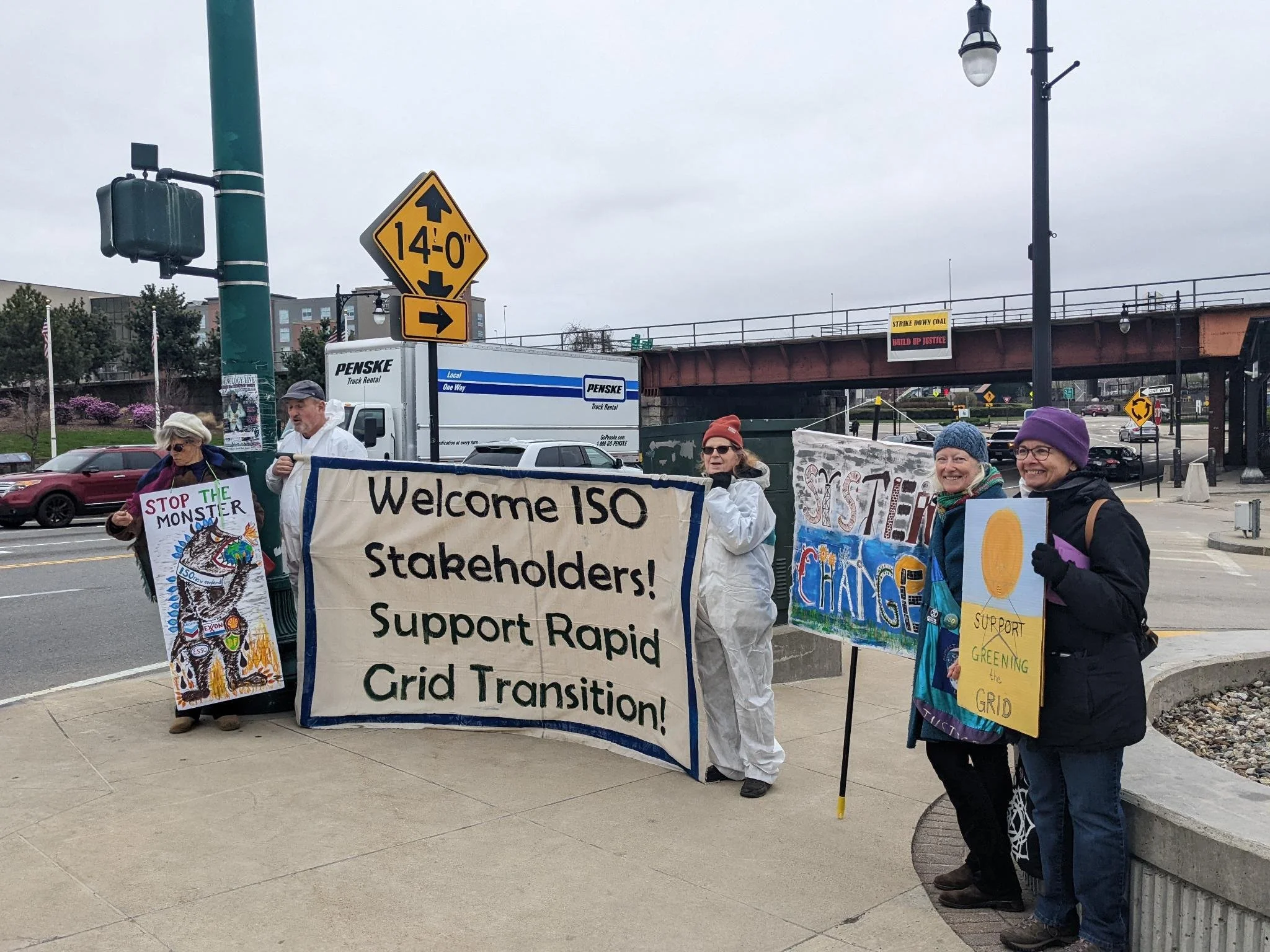On Tuesday April 26, two representatives from No Coal No Gas entered the hotel in Worcester Massachusetts where a meeting of ISO New England’s stakeholders, NEPOOL, was about to begin. We took seats at the conference room tables… as invited guests of the Chairman.
NEPOOL (New England Power Pool) members were meeting to discuss the newly released Pathways to a Future Grid Study. No Coal No Gas was there as part of our strategy for pushing ISO and its stakeholders to move quickly to decarbonize the power grid by ending “subsidies” for fossil fuels. While we sat inside, taking notes about how the system operates, fellow activists stood across the street with signs and banners welcoming ISO stakeholders and calling for rapid grid transition. At the same time, another team climbed onto a nearby railroad trestle and hung a banner calling for an end to burning coal, reminding everyone of previous direct actions where No Coal No Gas activists blocked trains from delivering coal to the Merrimack Station power plant in Bow, New Hampshire.
The story of how No Coal No Gas came to be invited to this meeting began with research into how ISO New England was responding to the climate crisis, and our strategy of communicating directly with ISO leaders and stakeholders to push for public transparency and accountability and rapid action. Escalating direct actions, including a standout in front of the house of Gordon van Welie, ISO’s President and CEO, led to communications with ISO’s Director of External Communications, NESCOE (New England States Committee on Electricity), and NEPOOL, who invited us to attend the April meeting where the Pathways Study would be discussed.
The study identifies four different options for transitioning the regional grid – status quo, forward clean energy market (FCEM), carbon pricing, and a hybrid of FCEM and carbon pricing. The agenda for the meeting was to discuss and clarify the details of the study. The discussion confirmed that the study does not point to a recommended path forward (although everyone seemed to agree that the status quo option is not viable).
At the end of the day, the message to participants was that this study is now complete. However, the decision-making process for selecting a path forward seems obscure and ambiguous. ISO has stated that they need more information about what the States want to do before making any changes, as all paths forward (except the status quo) require increased collaboration among the New England States. NEPOOL membership represents a diverse cross-section of industry stakeholders (including fossil fuel companies), and it seems unlikely that they will reach a consensus.
NEPOOL is asking for written comments from their stakeholders about their preferred path by June 6. They are also particularly asking for input from the States via NESCOE to help guide their recommendations. However, the current ability of the New England Governors to engage in regional policy deliberations seems limited.
Although the climate crisis is demanding rapid action to transition our energy systems, the bureaucratic systems that surround us are leaving us with completed studies but no clear lines of authority and decision-making for rapid action. Not once in the NEPOOL meeting was the urgent context of the climate crisis mentioned.
No Coal No Gas will continue our strategy to use direct action and targeted advocacy to push ISO and its stakeholders for public transparency and accountability. We are pushing ISO, NESCOE and NEPOOL to hold a public forum about the results of the studies, and to be transparent and accountable in their decision-making process. We will push NESCOE and the New England States to establish a coordinated approach that can help drive ISO’s next steps.
At the same time, we are continuing to advocate with the Federal Energy Regulatory Commission (FERC) to hold ISO accountable for a rapid grid transition. In partnership with Community Action Works and the Fix the Grid initiative, a total of approximately 250 comments were submitted to FERC expressing outrage at the continued ISO forward capacity funding of the Merrimack coal plant and the ISO proposal to maintain obstacles to equitable entry of renewables into the grid for another two years.



